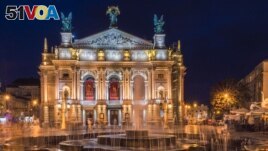07 April 2024
Editor's note: This story is one of the winning entries from the "Teach Us about Ukraine" writing contest sponsored by VOA Learning English and GoGlobal.
My name is Zhanna Kravchenko. I teach at Specialized General Education School No. 7. This is my essay.

FILE - Lviv opera house view, historical center at blue hour after sunset, Ukraine. 8-20-2017. (Adobe Stock Photo by RuslanKphoto)
Lviv is often referred to as the "Pearl of Ukraine."
The largest city in western Ukraine is home to more than 700,000 people. Founded in the 13th century, its cobblestone streets are not only picturesque but also filled with history.
The city was founded by Prince Danylo Romanovych of Galicia and named after his son, Lev. Galicia is now an area divided between Ukraine and Poland.
For more than 400 years, Lviv was a part of the Kingdom of Poland. In 1569, the Act of Union of Lublin connected Poland and the Grand Duchy of Lithuania. The measure led to the creation of the Polish-Lithuanian Commonwealth, one of the largest and most influential states in Europe. Lviv, with its central location, became a thriving cultural and economic center of the commonwealth.
Following the partition of the commonwealth in 1772, Lviv and the surrounding area of Galicia became a part of the Austro-Hungarian Empire. This era brought Central European influences to Lviv's culture and architecture. The beautiful Lviv Opera House is such an example.
The 20th century was a time of turmoil for the city. Lviv became a part of Poland again after Austria's defeat in World War I. The West Ukrainian People's Republic started a short-lived independence movement. The Soviet Union seized the city in 1939. Nazi Germany occupied the city during World War II. And the Soviets annexed the city in 1945.
The official Lviv tourism website says Ukrainian insurgents fought against the Soviets until the late 1950s. Tens of thousands of Ukrainians from the area were sent to concentration camps and exiled to Siberia.
In more recent history, Lviv played an important role during Ukraine's struggle for independence. The Orange Revolution in 2004 saw the city's central square, Rynok, filled with people calling for democratic change. The events that unfolded there helped shape the course of modern Ukrainian politics, solidifying the city's reputation as a stronghold of pro-European sentiment.
Beyond its historical significance, Lviv offers a tapestry of cultural delights. The city boasts a thriving arts scene, with numerous theaters, galleries, and music venues. It is a city where literature and poetry find their voice, celebrated yearly during the Lviv Publishers' Forum.
One cannot talk about Lviv's culture without savoring its culinary treasures. The aroma of freshly brewed coffee wafts through the air as you explore its charming cafes. Ukraine's coffee culture is deeply rooted here, with the first coffeehouse in the country opening its doors in Lviv in the 18th century.
But perhaps the most enduring aspect of Lviv's charm is its people. Warm, welcoming, and proud of their heritage, Lvivians have a way of making visitors feel like they have found a second home. Their passion for the city is infectious and they are always eager to share its stories with visitors.
From the picturesque rooftops to the cobblestone streets, Lviv is a city where history whispers from every building, city square, and street corner. For those who seek to understand Ukraine, Lviv is an open book, inviting you to explore its pages and discover the beauty within.
I'm Gena Bennett.
_______________________________________________
About the Writer
Zhanna Kravchenko was born in the Zaporizhia region of Ukraine, in the village of Nadezhdino, which unfortunately is currently under occupation. She met her husband while studying in Melitopol, and they currently live in Khmelnytskyi with their wonderful daughter. Zhanna has been teaching for 11 years and currently works as an English language teacher in the elementary grades at Specialized General Education School No. 7 in Khmelnytskyi. She takes great pride in her Ukrainian heritage and is passionate about being a Ukrainian.